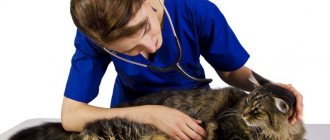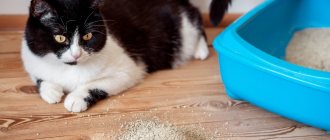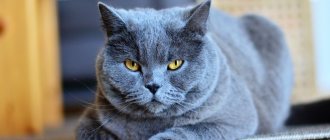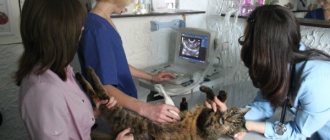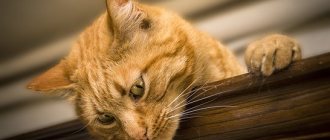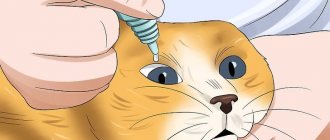Inflammation of the colon in a cat
Symptoms of colon inflammation in a cat
- Diarrhea.
- Problems with bowel movements.
- Mucus in the stool (sometimes bright red blood).
- Nausea (about 30% of cases).
- Sometimes - weight loss.
Treatment of colon inflammation in cats
First of all, contact your veterinarian. It will help identify and eliminate the cause of the inflammatory process.
Strictly follow the veterinarian's recommendations. In some cases, changing your diet is enough, but anti-inflammatory drugs may also be needed.
How does a species-typical diet help with gastrointestinal diseases?
Biologically appropriate cat food includes raw meat, organ meats, liver, small amounts of vegetables and bone. These are the main components of a healthy diet. The cat's body is designed to obtain the necessary nutrients and energy from animal protein. It is easily digestible and does not burden the kidneys, liver and other organs. A healthy diet should contain about 70%-75% liquid.
Gastrointestinal diseases in cats can be caused by disturbances in the microflora of the stomach. A varied, species-typical diet will help keep the microflora healthy. A healthy gastrointestinal environment protects cats from pathogenic bacteria and parasites and ensures stable, strong immunity.
A healthy diet is not only a means to combat gastrointestinal problems. Species-typical nutrition is an excellent and affordable way to prevent gastrointestinal diseases in cats. SUPERPET will help provide your cat with a biologically appropriate diet. The composition contains only natural ingredients. SUPERPET diets contain the required amount of fluid, enough taurine and all the vitamins and minerals needed for health. The food is stored and delivered frozen, so you can be sure that there are no preservatives in it. Help your pet eat right - this will keep him healthy and ensure a long and happy life.
Did you like the article? Tell your friends:
Comments
Constipation in a cat
In most cases, constipation is easy to manage. However, there are serious cases that are difficult to treat.
Long-term constipation can be caused by intestinal obstruction, narrowing of the intestine from external problems, or neuromuscular problems in the colon.
Symptoms of constipation in a cat
- Difficulty with bowel movements.
- Dry, hard feces.
- Sometimes: depression, lethargy, nausea, loss of appetite, abdominal pain.
Treatment of constipation in a cat
- Consume more fluid.
- Sometimes, if the constipation is mild, putting your cat on a fiber-rich diet and providing constant access to water will help.
- Laxatives are sometimes used, but only a veterinarian can prescribe them.
- In severe cases, the veterinary clinic may remove feces using an enema or other means under general anesthesia.
- If constipation is chronic and cannot be treated, surgery may be performed to remove the affected part of the colon.
You should not self-medicate, as medications that once helped you or someone you know can be very dangerous for your cat!
Diagnostics
To accurately determine the diagnosis, you should collect complete information about the pet. Note the peculiarities of feeding the animal, find out the allergic reaction to a number of medications, the number of contacts with sick animals, and household chemicals.
The owner should pay special attention to previous similar cases, if there were any, and compare their duration and symptoms. The doctor will need this information to make an initial or even final diagnosis.
This may seem strange, but in case of gastrointestinal diseases, test results (in particular urine) may be normal. On the other hand, biochemical analysis is most likely to determine the number of white blood cells or eosinophils.
Using an ultrasound, you can identify thickening in the intestines, determine the accumulation of gases in any area, but this will not be a reliable way to detect the disease, just like x-rays.
In modern veterinary medicine, the focus is on biopsy using an endoscope, where inflammatory areas and the percentage of affected cells are most likely to be identified.
The doctor may prescribe a trial diet to rule out the possibility of common food poisoning. It is typical for cats living in private homes, where keeping track of pets is much more difficult than in an apartment.
Sometimes bacterial culture of stool is used in combination with a urine test to exclude other diseases: analysis for salmonella, hypertension, liver disorders, or infection of the cat with the leukemia virus.
Coronavirus enteritis in a cat
It is a contagious disease associated with a virus and transmitted through close contact. The virus is transmitted through contaminated objects and feces.
Symptoms of coronavirus enteritis in cats
In kittens: fever, diarrhea, vomiting. Duration: 2 – 5 weeks.
In adult cats, the disease may not manifest itself externally.
Remember that even if the cat recovers, it may still be a carrier of the virus. Infection can only be prevented by minimizing the cat's contact with feces.
Treatment of coronavirus enteritis in cats
There are no specific treatment methods. As a rule, supportive medications and, if necessary, fluid infusions are prescribed.
Inflammation of the stomach (gastritis) in a cat
The cause of gastritis can be the ingestion of an object that violates the integrity of the mucous membrane.
Symptoms of inflammation of the stomach (gastritis) in a cat
- Nausea, which can cause weakness, lethargy, weight loss, dehydration, and salt imbalance.
- If gastritis is prolonged, you may notice food debris (for example, grass), blood or foam in the vomit.
- Diarrhea is common.
The prognosis depends on the causes of gastritis and the success of the treatment.
Bowel cancer in a cat
The disease is quite rare (approximately 1% of cancer cases in general). Most often, cancer affects the large intestine in an older cat. The causes of the disease have not yet been precisely determined, but there is a version that the alimentary form of lymphoma may be caused by the feline leukemia virus. Typically, intestinal tumors in cats are malignant and grow and spread quickly.
Symptoms of intestinal cancer in a cat
Symptoms depend on the location and size of the lesion, but often include:
- Nausea (sometimes mixed with blood)
- Diarrhea (also bloody) or difficulty defecating, constipation
- Weight loss
- Abdominal pain
- Bloating
- Abdominal infections associated with intestinal diseases
- Sometimes – manifestations of anemia (pale gums, etc.)
Diagnosis includes a medical history, physical examination, and biopsy of tissue samples.
The preferred treatment is surgical removal of the tumor.
The prognosis can be good or bad, depending on the type of tumor and whether it can be removed.
Forms of inflammation
In veterinary medicine, intestinal inflammation in cats is divided into two forms - chronic and acute. Each of them has its own characteristics, which must be taken into account when diagnosing pathology and its treatment.
Chronic
Such inflammation appears if the acute form has not been completely treated and, after eliminating the symptoms, the cause of the disease itself remains unidentified. As a result, there is a regular alternation of relapses and remissions and symptoms appear and disappear. A similar phenomenon can be observed when the initial disease had a mild course and was not paid attention to. Because of this, the immune system, without help from medications, inhibits the causative agent of inflammation, but cannot destroy it completely, and periodically it reminds itself.
Also in chronic form, enteritis and enterocolitis in animals are found in the following cases:
- advanced age;
- the period after a cat suffered severe viral infections, when for a long time it was necessary to use drugs that are aggressive to the intestines for treatment;
- decreased immunity;
- kidney pathologies - when uric acid enters the blood, and because of this inflammation is provoked
- intestinal mucosa;
- liver pathologies;
- severe heart disease;
- constant improper feeding without a regimen.
You might be interested in: What causes a cat's paw to swell?
Chronic inflammation is difficult to treat, and in some cases it cannot be completely eliminated, even with proper therapy.
Acute
The acute form of the disease is dangerous because its symptoms increase rapidly and life-threatening conditions can develop in a short time. Veterinary assistance is required immediately, otherwise the cat will not be saved. The phenomenon itself cannot pass. Most often, this condition occurs due to viruses, poisoning and volvulus, as well as due to intestinal obstruction. It is impossible to miss acute intestinal inflammation in a cat. The general condition of the animal suffers so much that it becomes noticeable immediately. In addition, severe vomiting and diarrhea are sure to occur.
In acute inflammation, the symptoms will be vivid. If the problem has a chronic course, then it may manifest itself mildly, which is why the owner, if he is not very attentive to the condition of the cat or she has a free range, will not know about her illness. The manifestations of both forms are identical and differ only in their intensity.
You can suspect that your pet has intestinal inflammation based on the following symptoms:
- diarrhea, in which the stool is very watery, foamy, sometimes streaked with blood - in acute inflammation, the urge to defecate is very frequent, and in chronic inflammation, their quantity does not differ from the norm and only the type of feces changes;
- sharp putrid odor from feces;
- alternating diarrhea and constipation is typical for chronic inflammation;
- bloating;
- a significant decrease in appetite - in severe cases, up to complete refusal of food;
- abdominal pain, which can be detected by palpation;
- general depressed state;
- Moderate to severe vomiting, which may contain blood or, in severe cases of infestation, worms and worm parts.
In an acute form of the pathology, a sick cat quickly develops severe dehydration, which can cause death. In adult animals this occurs within 12 to 24 hours, and in kittens - from 6 to 12 hours.
Gastrointestinal obstruction in a cat
Causes may include tumors, polyps, foreign objects, or overgrowth of stomach tissue.
There may be partial or complete intestinal obstruction.
Symptoms of gastrointestinal obstruction in a cat
- Decreased appetite
- Lethargy
- Diarrhea
- Nausea
- Pain when swallowing and in the abdominal area
- Increase or decrease in temperature
- Dehydration.
To diagnose the disease, the veterinarian must know everything about the cat's diet, as well as whether there was access to needles, thread, small toys, etc. Palpation, ultrasound, x-ray or endoscopy are used.
Treatment of gastrointestinal obstruction in cats
Sometimes intravenous fluids help.
If the obstruction cannot be cleared with the help of an endoscope, surgery is necessary. This may also be necessary if the condition worsens suddenly and the cause is unknown.
Many cats recover well after surgery.
Main symptoms of the disease
It is problematic to independently distinguish gastritis from gastric ulcer. The symptoms of these pathologies largely coincide, so to make an accurate diagnosis, we recommend contacting a veterinary clinic.
Among the symptoms indicating the development of a stomach ulcer:
- severe pain,
- vomiting with blood,
- rapid weight loss,
- oppression,
- lethargic state
- constipation,
- pallor of the mucous membranes,
- black chair,
- elevated temperature,
- specific odor from the mouth.
Note! When palpating the abdominal area, cats experience pain: they worry, moan, and meow loudly.
Owners will immediately notice changes in the pet’s behavior: it becomes very lethargic and apathetic, practically does not move, and stops playing and running. He lies down, rests and sleeps more. Refuses to eat and drinks a lot.
Intestinal ulcer in a cat
Ulcers are sores on the surface of the intestines or stomach caused by digestive enzymes or gastric juices. Causes: the use of certain medications, infections, tumors and a number of other diseases.
Symptoms of intestinal ulcers in cats
- Nausea (sometimes with blood)
- Discomfort in the abdominal area that goes away after eating
- Pale gums (this sign indicates anemia)
- Tarry, dark stools are evidence of the presence of blood.
Diagnosis is carried out using special tests, and X-rays or ultrasound are used to confirm the diagnosis. A biopsy of the cat's intestines and stomach and endoscopy may also be used.
It is extremely important to determine the cause of the disease in order to prescribe the correct treatment. Supportive care and a light diet are of great importance. Drugs are prescribed to reduce stomach acidity and heal ulcers. Typically the duration of treatment is 6 – 8 weeks.
It is good if it is possible to monitor the progress of treatment using endoscopy. If medications don't help, biopsies are taken of samples from the small intestine and stomach.
If we are dealing with a peptic ulcer of a cat's stomach or a benign tumor, the prognosis is good. If the ulcer is associated with liver or kidney failure or gastrinomas or stomach carcinoma, it is bad.
Inflammatory bowel disease in cats
Idiopathic inflammation is a group of diseases of the digestive system with persistent symptoms but an unclear cause.
Cats of any gender, age and breed can get sick, but, as a rule, inflammation begins at the age of 7 years and older. Symptoms may come and go.
Symptoms of inflammatory bowel disease in cats
- Changes in appetite
- Weight fluctuations
- Diarrhea
- Nausea.
Inflammation is difficult to diagnose, as similar symptoms can indicate many other diseases.
Treatment of inflammatory bowel disease in cats
The goal of treatment is to eliminate diarrhea in the cat, and, consequently, increase weight and reduce the inflammatory process. If the cause is identified (diet disorders, drug reactions, increased bacteria or parasites), it must be eliminated. Sometimes a change in diet helps, sometimes it helps treatment and makes it possible to reduce the number of medications or completely eliminate them.
The veterinarian sometimes recommends the use of hypoallergenic or eliminated food. As long as your pet is on this diet (at least 4-6 weeks), he should not take medications without the approval of a veterinarian.
Inflammatory bowel disease can often be controlled through a combination of medications and diet, but a complete cure is rarely achieved and relapses are possible.
Prevention
To prevent the development of the disease, owners must adhere to a number of simple rules:
- feed the cat only specialized food;
- change the water every day;
- do not give spoiled food;
- do not overfeed.
Expert opinion
Burmistrova Alena Valerievna
Breeder, 7 years experience.
Compliance with these preventive measures will help maintain the health of your pet.
